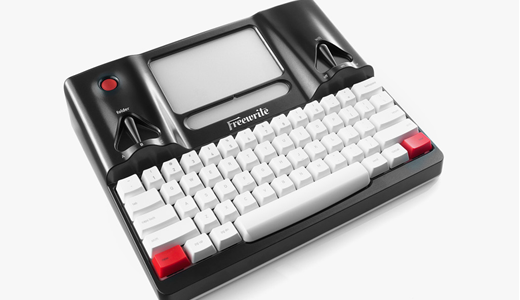About a year ago, my youngest daughter came in excitedly carrying a funny little contraption that she and her boyfriend had found at a thrift store. She knew it had something to do with writing in days gone by, so she picked it up for me for a few bucks. Of course, being in the Millennial generation as she is, she had never actually seen one of these gadgets before and was sorta curious as to how it might work. So I grabbed some paper and showed her.
Yep, as you probably already guessed, the doodad in question was an old portable Royal typewriter, complete with its own handy-dandy carrying case. But before you roll your eyes at the silliness of such a useless thingamajig in this digital day of computers, laptops and tablets, you might just want to pause for a moment. For it seems that everything old is becoming new once more.
I recently spotted some ads and articles crowing about the wonder and benefits of something called a Freewrite, what its creators have dubbed a “smart typewriter.” If you check out the YouTube video below you’ll see that it’s essentially a little battery powered word processor with typewriter-like mechanical clicking keys.
Why might this be such an incredibly exciting device for a budding Millennial scribe? Well, because it gives them the opportunity to pursue something called “distraction-free writing.” We’ve gotten so connected it seems—especially through our perpetual ties to a myriad of social media outlets—that it’s almost impossible to be purely creative.
In fact, in a businessofsoftware.org article, writer, programmer and conference speaker Kathy Sierra went so far as to say that simply making the effort to not check your Facebook page drains away a fair share of your creative juice. Her theory is that our reservoir of cognitive resources is a scarce and finite thing that can be depleted just as easily by the use of willpower and things that try to distract us as it is by actually writing that great American novel you’ve always wanted so desperately to start.
The creators of the Freewrite suggest that by taking things offline, sitting out on a hillside or park-bound bench with an unconnected little word processor like theirs, you can change all that. You can keep your mental reservoir full, ready to spill over into the creative output it was meant to be poured into. And acquiring that amazing device will only cost you $500.
Who knew that we old-school typewriter tap-tappers were actually so progressively frugal with our finite cognitive resources? Of course, when Millennials get around to re-inventing the pencil, then we oldsters are really gonna be ahead of the curve.






Recent Comments